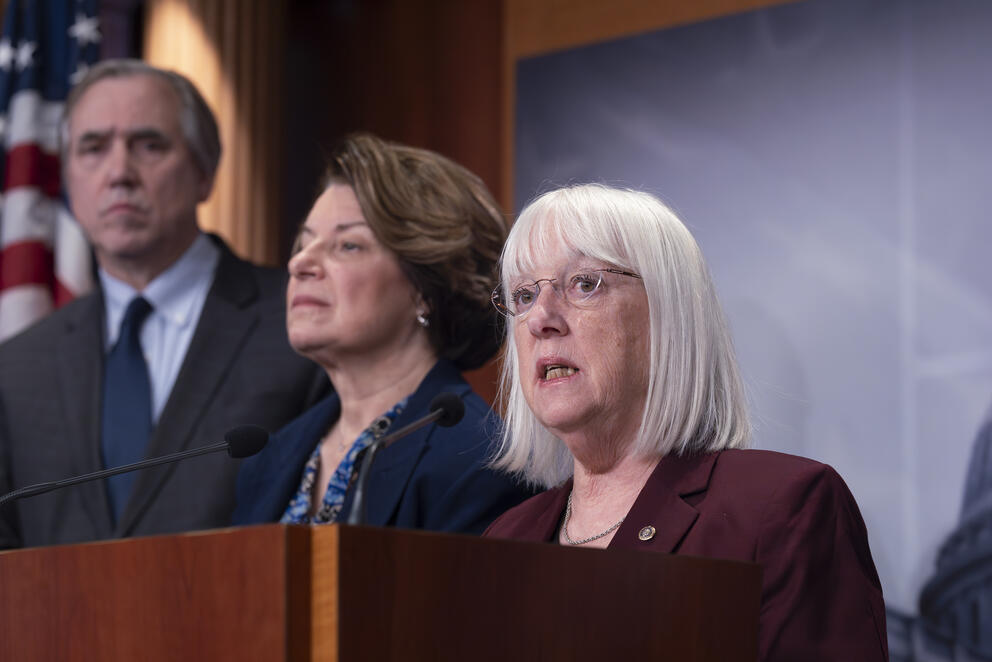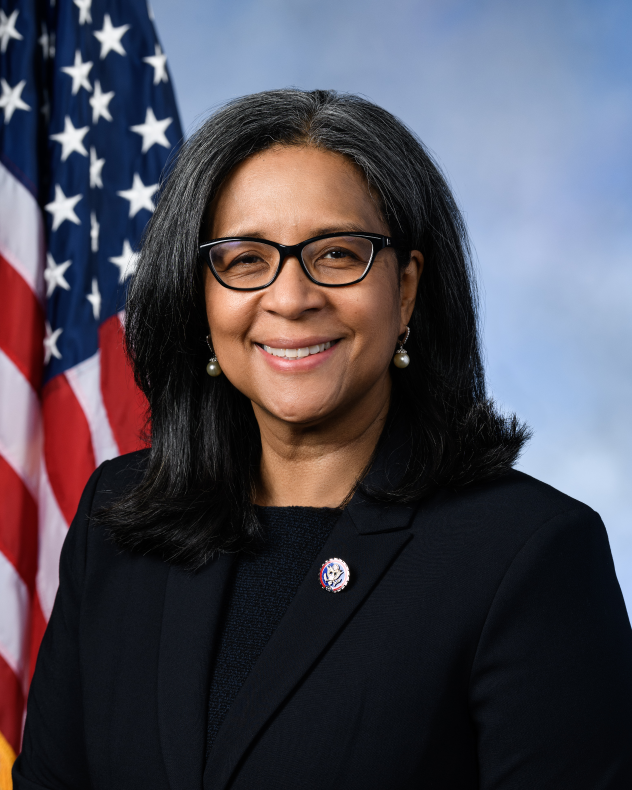This story was originally published by the Washington State Standard.
WASHINGTON — A federal district judge ruled Tuesday the Trump administration must wait until at least next week before it can move forward with pausing federal spending on trillions in grants and loans, though she emphasized the short-term administrative stay might not continue after a Feb. 3 hearing.
District Judge Loren L. AliKhan’s decision temporarily blocks the Office of Management and Budget from moving forward with plans to stop payments on multiple federal programs, which it announced late Monday.
The two-page memo from the Office of Management and Budget announcing the freeze led to significant confusion throughout the day Tuesday among members of Congress — including Republicans — about what programs were affected and frustration the White House appeared to be eroding lawmakers’ constitutional spending authority.
AliKhan’s ruling came less than 24 hours after news broke of the Trump administration’s planned action.
AliKhan said after hearing arguments from an attorney for the organizations that filed the lawsuit earlier Tuesday, and from an attorney representing the federal government, that “anything that was due to be paused as of 5 p.m. today to open funding on grants is stayed.”
AliKhan, appointed to the bench by former President Joe Biden, added that any funding impacted by separate executive orders is not covered by the temporary administrative stay she issued. She ordered for both sides in the case to file briefs to her later this week, and scheduled a hearing for Feb. 3 at 11 a.m. Eastern.
Diane Yentel, president and CEO of the National Council of Nonprofits, one of the organizations that filed the suit, said shortly afterward there are several steps ahead to fully block OMB’s actions.
“A lot more work to do in the courts … to ensure that this reckless action, or attempted action by OMB, can’t move forward in the long term,” Yentel said.
Confusion on Medicaid
White House press secretary Karoline Leavitt sought to downplay the impact of the spending freeze during her first-ever briefing, saying it wouldn’t apply to individual assistance programs, like Social Security or the Supplemental Nutrition Assistance Program or welfare benefits.
She was unable to answer questions about the effect on Medicaid benefits but a later White House memo claimed they would continue without interruption. Nonetheless, Democratic U.S. senators reported Medicaid portals in all 50 states were down on Tuesday.
Leavitt said the White House counsel’s office had signed off on the temporary spending pause and believed it was legal and constitutional, but she later told reporters she didn’t know the full scope of the impact and would have to circle back after the briefing ended.
“I have not seen the entire list because this memo was just sent out, so I will provide you all with updates as we receive them,” Leavitt said.
Maine Republican Sen. Susan Collins, chairwoman of the Appropriations Committee, said in a brief interview she supports the Trump administration reviewing federal spending to look for ways to improve efficiency, but said the OMB’s action was too broad.
“This is far too sweeping and will have an adverse effect on the delivery of services and programs,” Collins said. “I do appreciate that the administration did not apply it to Social Security, Medicare, direct benefit programs. But nevertheless, it does have a large impact on the provision of services and programs.”
Collins said she had concerns about the Head Start program being listed among those that will have a spending freeze.
“There are a lot of federal programs that appear to be swept up in this order, and I think the administration needs to be more selective and look at it one department at a time, for example,” Collins said. “But make sure important direct service programs are not affected.”
Multiple memos
The original OMB memo sent out late Monday evening appeared to apply to large swaths of federal financial assistance, including grants and loans, though a memo footnote said it should not be “construed to impact Medicare or Social Security benefits.” It did not mention an exemption for Medicaid.
“Financial assistance should be dedicated to advancing Administration priorities, focusing taxpayer dollars to advance a stronger and safer America, eliminating the financial burden of inflation for citizens, unleashing American energy and manufacturing, ending ‘wokeness’ and the weaponization of government, promoting efficiency in government, and Making America Healthy Again,” the OMB memo states.
A separate memo from OMB lists off the programs that will be paused temporarily while it reviews which federal spending it deems appropriate.
The list includes the Department of Agriculture’s tribal food sovereignty program, Head Start, the Veterans’ Affairs Department’s suicide prevention and legal services grants, the Low-Income Home Energy Assistance, or LIHEAP, program, and numerous sexual assault prevention programs within the Department of Justice.
A third document from OMB, sent to Capitol Hill, claimed that Medicaid would not be affected. However, some senators reported the Medicaid portal was inaccessible on Tuesday afternoon.
“In addition to Social Security and Medicare, already explicitly excluded in the guidance, mandatory programs like Medicaid and SNAP will continue without pause,” the OMB document states. “Funds for small businesses, farmers, Pell grants, Head Start, rental assistance, and other similar programs will not be paused. If agencies are concerned that these programs may implicate the President’s Executive Orders, they should consult OMB to begin to unwind these objectionable policies without a pause in the payments.”
Oregon Democratic Sen. Ron Wyden posted on social media that his staff had “confirmed reports that Medicaid portals are down in all 50 states following last night’s federal funding freeze.”
“This is a blatant attempt to rip away health insurance from millions of Americans overnight and will get people killed,” Wyden wrote.
Yentel, of the groups that sued, said while Leavitt argued that the memo did not impact those in need of direct assistance, OMB did not define who counts as “direct assistance.”
She said during a briefing with reporters that the memo leaves “a lot of room to who defines direct assistance to Americans.” Yentel said she would consider one of the programs impacted, Head Start, as direct assistance.
Order prompts legal challenges
Numerous organizations — including the National Council of Nonprofits, American Public Health Association and Main Street Alliance — filed a lawsuit in federal court Tuesday ahead of the temporary pause taking effect.
Democratic attorneys general were also preparing to file a lawsuit, challenging the legality of the temporary spending pause on grants and loans.
New York state Attorney General Letitia James said during a virtual press conference announcing the lawsuit that Trump had overstepped his presidential powers by instituting the temporary spending pause.
“This president has exceeded his authority, he has violated the Constitution and he has trampled on a co-equal branch of government,” James said.
She said Democratic attorneys general filing the lawsuit were not trying to be “adversarial” or seeking to block Trump’s agenda.
“This is a question of the Constitution and the rule of law. And all of us took an oath to obey the Constitution and to uphold it,” James said.
New Jersey Attorney General Matthew J. Platkin said during the press briefing that the lawsuit wasn’t “about nibbling at the edges of the president’s authority.”
“We’re talking about ignoring the entirety of the United States Constitution,” Platkin said.
Attorneys general from New York, Arizona, California, Colorado, Connecticut, Delaware, Hawaii, Illinois, Maine, Maryland, Massachusetts, Michigan, Minnesota, Nevada, North Carolina, New Jersey, New Mexico, Oregon, Rhode Island, Vermont, Washington, Wisconsin and the District of Columbia plan to file the lawsuit.
Appropriators protest
The top Democrats on the U.S. House and Senate Appropriations committees sent a letter to acting OMB Director Matthew J. Vaeth, expressing alarm about how the stop in payments would affect people throughout the country and challenging the legality of the executive branch trying to overrule the legislative branch on spending decisions.
House Appropriations Committee ranking member Rosa DeLauro, D-Conn., and Senate Appropriations Committee ranking member Patty Murray, D-Wash., wrote that the scope of the halt in funding, which was approved by Congress on a bipartisan basis, “is breathtaking, unprecedented, and will have devastating consequences across the country.”
“While we may have strong policy disagreements, we should all be united in upholding our nation’s laws and the Constitution,” DeLauro and Murray wrote.
“We will be relentless in our work with members on both sides of the aisle and in both chambers to protect Congress’s power of the purse,” they added. “The law is the law — and we demand you in your role as Acting OMB Director reverse course to ensure requirements enacted into law are faithfully met and the nation’s spending laws are implemented as intended.”
Power of the purse lies with Congress
Article I, Section 9, Clause 7 of the Constitution gives Congress the so-called “power of the purse” by granting it the authority to approve federal spending.
Congress has passed several laws regarding that constitutional authority, including the 1974 Impoundment Control Act, which says that the president cannot simply refuse to spend money Congress has appropriated.
Trump’s pick for OMB Director, Russ Vought, has repeatedly called that law unconstitutional and said he believes the president does have the authority to simply ignore sections of spending law that have been passed by Congress and signed into law.
The Senate has yet to confirm Vought to the role of White House budget director, but is likely to do so in the weeks ahead.
Sharon Parrott, president of the Center on Budget and Policy Priorities, a left-leaning think tank, posted on social media that the OMB memo’s “vague and contradictory language makes it hard to know if funding is imperiled for public schools, community health centers, state and local law enforcement, veterans’ housing, health care through Medicaid, public services on tribal lands, etc.”
“This confusion & apparent withholding of funding isn’t a political game – real estate, local, & tribal governments, school districts, nonprofits, & private charities delivering services we all depend on, funded with taxpayer dollars, can’t function without resources and clarity,” Parrott wrote. “Congress has enacted legislation that requires the Executive Branch to fund public services, and the Trump Administration seems determined to subvert Congress, its hand-waving about following the law notwithstanding.”
Parrott worked at OMB as associate director of the Education, Income Maintenance, and Labor Division during then-President Barack Obama’s second term.
Jenny Young, vice president of communications and chief of staff at Meals on Wheels America, said the OMB memo “could presumably halt service to millions of vulnerable seniors who have no other means of purchasing or preparing meals.”
“And the lack of clarity and uncertainty right now is creating chaos for local Meals on Wheels providers not knowing whether they’re going to be reimbursed for meals served today, tomorrow, who knows how long this could go on,” Young said. “Which unfortunately means seniors may panic not knowing where their next meals will come from. This adds insult to injury as these programs are already underfunded to begin with. Largely speaking, local providers don’t have the ability to absorb a blow like this, especially if it persists for any extended period of time.”
Young said the Older Americans Act Nutrition Program, which provides some of Meals on Wheels funding, is a grant program administered by the Administration on Aging.
Members of Congress react
Senate Budget Committee Chairman Lindsey Graham, R-S.C., said he was talking with staff at OMB to “try to get more information on how this works.”
Graham said he wouldn’t delay a committee vote Thursday to send Vought’s nomination to the Senate floor.
“We need more information about this, but we also need a guy in charge,” Graham said.
Kansas Republican Sen. Jerry Moran, a senior appropriator and chairman of the Senate Veterans’ Affairs Committee, said during a brief interview that leadership at the VA was supposed to talk with OMB officials on Tuesday afternoon to figure out how exactly they were supposed to carry out the spending freeze for certain grant and loan programs.
“We’re trying to get additional information about what it means on grants,” Moran said. “I just came from a veterans’ hearing where that was the topic of conversation. And my understanding is the VA leadership is meeting with OMB to learn the details, and then I’ll have more of a response.”
Alaska GOP Sen. Lisa Murkowski, who sits on the Senate Appropriations Committee, echoed similar remarks that she wanted more information on how much the memo impacted those federal programs.
North Dakota Republican Sen. John Hoeven, a senior appropriator, said he isn’t too concerned about the temporary pause to federal grant and loan programs.
“He’s taking a look at a lot of the spending as he should; reviewing it, finding out what makes sense and what doesn’t,” Hoeven said. “Just because it gets paused doesn’t mean it won’t get funded. And hopefully the ones that are funded are funded in a better way, more in line with our priorities.”
Iowa Republican Sen. Joni Ernst said she wasn’t worried about the impact of the temporary pause to grants and loans at the Defense Department and VA.
“I think they will take a look at it, they will release the funds as they find it necessary,” Ernst said. “So I think there’s a big flurry in the press right now, but I think that President Trump is doing the right thing by scrutinizing our spending.”
‘Take a deep breath’
North Carolina GOP Sen. Thom Tillis, an advocate for federal disaster aid, said he was skeptical that the freeze would immediately impact people in need of disaster relief.
“I can’t imagine that the president would knowingly cut off housing assistance for people displaced from their homes,” he said. “We need to get to the facts versus the fear.”
Senate Majority Leader John Thune said during a press conference that he expected additional information from the Trump administration about the pause.
“They’re providing additional clarity and guidance on that, and hopefully they will further clarify what exactly will be impacted,” he said. “But I don’t think it’s unusual for an administration to pause.”
Sen. James Risch of Idaho added: “This is a work in progress. Everybody take a deep breath, stay calm. Every one of these programs is gonna be looked at.”
Ariana Figueroa, Shauneen Miranda and Ashley Murray contributed to this report.
The Washington State Standard originally published this story on Jan. 28, 2025.






